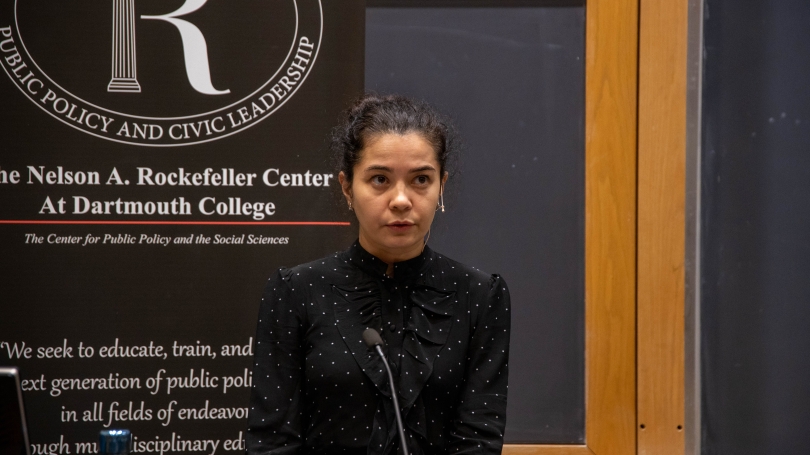
- Public Policy
- Leadership
- Funding
- News & Events
- About the Center
Back to Top Nav
Back to Top Nav
Back to Top Nav
Back to Top Nav
On Wednesday, May 22, 2019, Ukrainian journalist, Nieman Fellow, and editor-in-chief of Ukraininan online newspaper Ukrayinska Pravda Sevgil Musaieva gave a talk at the Rockefeller Center titled “Truth is Our Math: How to Restore Trust in Media When the Society is Polarized.” In her lecture and an interview with the Rockefeller Center, Musaieva defended the freedom of the press, shared emotional anecdotes about her career as a journalist in a post-communist country, and discussed her experiences with the evolving nature of truth.
She tied the history of the USSR to her reporting, noting that the people of her nation, the Crimean Tatars, were deported to Uzbekistan during World War II and only allowed to return to Crimea during the collapse of the Soviet Union.
“The Tatars were not mentioned in Soviet history books or in Soviet newspapers,” Musaieva said. The fall of the Eastern bloc brought new openness in the media that shed light on the Tatar plight, yet just a few years later, due to the efforts of oligarchs, “the Ukrainian media market was under the control of the authorities and friendly businessmen.”
Musaieva, who began her journalistic work as a teenager writing for her local paper, was greatly influenced by the 2000 murder of Georgiy Gongadze, one of the founders of Ukrayinska Pravda and an independent journalist. The murder, alleged to have been committed on the orders of the government of Ukraine, raised the profile of Ukrayinska Pravda in the country.
“All Soviet people knew the name of the [Soviet] newspaper, Pravda, ‘Truth,’ and this word had an extremely negative connotation. We decided to give new meanings to old concepts,” Musaieva said. Today, Ukrayinska Pravda is one of the few independent outlets in the country.
She spoke on the 2014 Russian annexation of Crimea, a province of Ukraine heavily populated by Russian-speaking people – and her homeland. Musaieva noted the influence of Russian propaganda in the invasion and the subsequent war in eastern Ukraine, in which Russian-backed rebels are fighting against Ukrainian government forces.
“When Russia occupied Crimea, the Russian media lied that Ukrainian fascists … were preparing provocations in Kiev,” she said. “This strategy is successful. Some people who live in the occupied territory are still confident that Russian is protecting them from Ukraine.” Musaieva added that when there are those with vested interests in the truth, and a country becomes polarized, “the price of truth becomes very high. And sometimes, people just don’t want to hear it.”
Around this time, Ukrayinska Pravda was preparing an investigation into sexual violence perpetrated in eastern Ukraine by pro-Russian forces and Ukrainian Army forces alike. When they published the article, they received criticism from Ukrainians who said this hurt the country’s war effort. “We were accused of not being patriots to our country and of helping the enemy,” she said. “But we continued to do our regular work,” she added, because she intended to defend freedom of the press.
Another one of her colleagues, Pavel Sheremet, was killed by a car bomb in 2016 after reporting critically on the governments of Ukraine, Russia, and Belarus. After this event, Musaieva said that journalists at Ukrayinska Pravda began asking for their more controversial stories to be published anonymously. It contributed, she said, to an “atmosphere of fear and despair within the editorial staff.”
Journalists have been the targets of criticism in recent years in Ukraine, and Musaieva said that a drop in trust was exploited and encouraged by Ukrainian authorities. She added that this is a problem worldwide. “The undermining of trust in the media is being debated and spoken all over the world,” Musaieva said. “What kind of journalism should there be in the era of post-truth, and how do you maintain the trust of readers if any politician can call you a liar?”
She closed her talk by emphasizing the absolute importance of truth in journalism. “Truth is the math of our profession. Truth is the greatest value,” she said, adding that she believes truth in the Soviet media could have saved thousands of lives. Finally, she said that journalists must stand up for freedom of the press. “Democratic values in your country help to spread those principles among other nations. And it’s now time to fight back on this disruptive moment in history.”
-Written by Kyle Mullins ’22, Rockefeller Center Student Program Assistant for Public Programs